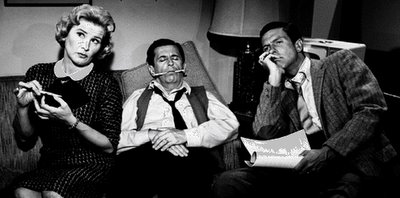 These are professionals. How I hope someday to emulate them.
These are professionals. How I hope someday to emulate them.Can you believe I still have enough items scrivenly to do a mini magpie carnival of the bookish again today? After this, I swear the leftover pail is empty.
Short stories: JA Konrath declares a day for submission, and Tim Worstall notes a new prize in the UK. I have some flash fiction I can submit immediately to an online journal, and probably will for grins, but my shorts need a little more boiling before throwing them against the big brick wall of the Ellery Queen or Alfred Hitchcock magazine. Still, it's all on the list.
I currently have five big writing projects that I need to organize if I hope not to lose momentum. I really admire those prolific journeyman scribes, like some noted below, who churn out lots of good work, and can do it across venues and genres. Because they're workmanlike in their production, you don't have to suffer the difference in their output if they've got dropsy or the blues. They're like the venerable Rob Petrie and Buddy and Sally, the kind of people about whom Alastair Cooke famously said (in various versions) :
A professional is a person who can do his best
at a time when he doesn't particularly feel like it.
Forgetting the pure artistes for the moment, I think to be a writer solicited for work and actually paid for it is both worthy and wonderful, so I don't look down on people who are entrusted with beloved, copyrighted characters for the purpose of writing tie-in materials for other media. In fact, I'm currently playing a CSI adventure game for which Max Allan Collins wrote the scripts, having done novels for the series as well.
(Game-related Aside: If I see Mr. Collins at the upcoming MWA stuff, I'm probably too much of a fan to point out the few plot points that went astray inside the CSI game structure. The motivation for a murder can't be created by something that happens after the death. And, technically, there's some of the dreaded pixel hunting, when you know you're supposed to find something somewhere, but the cursor won't light up unless you drag very, very slowly over the entire scene, pixel-by-pixel. Nonetheless, I like using all the different equipment, and to have 5 discrete, episodic cases makes for good intermittent play. Besides, each case is accompanied by the CSI actors' voices from the TV series, and in a merciful move, they've let the characters get you results right away, rather than the "I'll work on it, come back later" frustration found in other, analytic adventure games. All in all- it's fun. I ask no more. Now back to the subject.)
Lee Goldberg has also written tie-in books for the series Diagnosis: Murder and Monk, and has had the recent satisfaction of seeing one of his previously sneering colleagues turn toward the light.
I confess I hadn't thought much about discrimination against tie-in writers, but I'm sure it's there, as their work may be considered unoriginal. But read as many lousy Sherlock Holmes' pastiches as I have, and you'll realize that established characters and milieu do not a fine story experience guarantee. Only a good writer can provide that, and among this list of past and present practitioners cited by the International Association of Media Tie-In Writers, you'll recognize some very talented authors.
And now in my personal grande mal of all tie-ins, I'm going to tie together this whole post by noting that Kevin J. Anderson has not only written Star Wars tie-in novels, but he has a new collection of short stories, which yours truly has just reviewed at (fill-in-the-blank) bookspot.com. Revel in the knotted beauty.
BTW, this last won't matter except to jerks like me, but in the wee hours this morning, it will be
1:23 on 4/5/06 and again tomorrow afternoon. Talk about savoring the symmetry. mmmm...

No comments:
Post a Comment